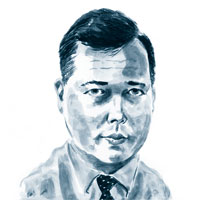Survival of the thickest

First emergency slot of the day. The lady is looking distressed, and her 12-year-old son is looking like he’d rather be somewhere else. ‘Jason tells me that when he woke up this morning, some white stuff came out of his penis, doctor. So I brought him straight down.’
In all seriousness, I do not make this up. Which leads me to a terrible conclusion; that we all have consultations like this.
I’m going to skim over the rest of our encounter. I asked just enough questions to confirm that it was what we all know it was, but hopefully not to scar the lad for life. His mother seemed reassured to a degree, but still doubtful. ‘So do you think it might happen again, doctor?’ As a magazine columnist I’m reluctant to use the phrase ‘lost for words’, but I had to keep my face and my palm forcibly separated. ‘Yes,’ I managed. ‘Yes I do.’
Jason can be excused, he’s just a young lad. But his mother must have at least a passing acquaintance with the white stuff, because, well, there’s Jason. What was going on in her brain? A colleague told me of a not-unrelated consultation when a young lady complained she got a vaginal discharge after sex: ‘But only when my boyfriend doesn’t use a condom’.
That same colleague made an observation that has stuck in my mind. ‘Imagine how thick the average person is,’ she said to me. ‘Now remember: fully half the population are even thicker than that.’
Elitism is a terrible charge in this day and age, and I don’t want to be seen as running our patients down. It stands to reason that we are going to see the dafter end of the spectrum, because for every Jason’s mam using up an emergency appointment, there must be dozens who are resigned to washing the sheets more often.
But oh dear, oh dear. Recent research has indicated that IQ scores have dropped 13 points since the Victorian era. My immediate reaction was: ‘Is that all?’.
Not that long ago I saw a young girl of a similar age to Jason, whose mother was concerned about the two lumps that had appeared under her nipples. To be fair, the mother did suspect they might be tits. ‘But you can’t be too careful, doctor.’
I tend to assume, when I’m talking to patients, that everyone has a GCSE biology-level idea of what is going on in our bodies, but I am increasingly having to admit this is wildly optimistic. From the patient who has just discovered (after 50 years) their own xiphisternum or the lumps on the back of their tongue, to the septuagenarian (and this is true as well) who had just found out that, if he nips his nose and blows hard, his ears pop, one wonders how some of these people have survived so long.
I have spent an entire consultation with a lady who complained her fingernails were stinging after she had cut them too short. I know a lady who stabs her own axilliary abscesses with a carving knife because: ‘That’s what you doctors would do, isn’t it?’
This is what makes us GPs such amazing dinner guests. I would say that all human life is here.
Except if that’s all human life, count me out.
Dr Phil Peverley is a GP in Sunderland.









